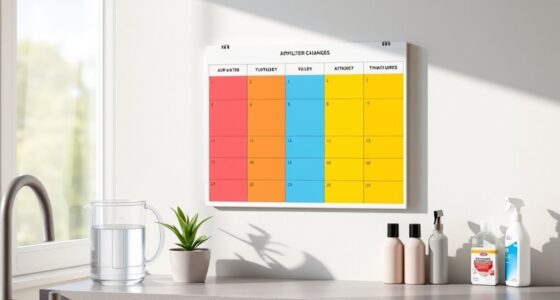As a caregiver, you should regularly check mobility aids for safety, establish consistent personal care routines, and maintain a clutter-free living space. Create a schedule for meal preparation and effectively manage medications. Engage in physical activity to promote health and utilize technology for remote monitoring. Don't forget to seek support from local caregiver resources and prioritize self-care for your well-being. Keep these tips in mind, and you'll discover even more strategies to enhance your caregiving journey.
Key Takeaways
- Regularly inspect mobility aids for wear and tear, ensuring brakes and wheels function properly for safety.
- Maintain a reliable medication management system with reminders and logs to prevent missed doses and confusion.
- Establish a cleaning routine to declutter living spaces and enhance accessibility, promoting a healthier environment.
- Schedule daily hygiene practices and utilize adaptive tools to encourage independence in personal care routines.
- Incorporate physical activity into daily life and prioritize self-care to reduce caregiver burnout and enhance overall well-being.
Regularly Check Mobility Aids for Safety

Regularly checking mobility aids for safety is essential for preventing accidents and ensuring user comfort. As a caregiver, you should inspect walkers and wheelchairs for any wear and tear, ensuring all components like brakes and wheels are functioning properly.
Cleaning these aids weekly helps remove dirt and debris that could compromise safety. Don't forget to check the height adjustments for ideal ergonomics, which can greatly reduce the risk of falls.
Promptly replace any worn or damaged parts, such as grips and footrests, to maintain high safety standards. Finally, store mobility aids safely when not in use to prevent tripping hazards and prolong their lifespan.
Your diligence in these tasks greatly enhances the user's experience and safety.
Establish Consistent Personal Care Routines

Establishing a consistent personal care routine helps seniors feel secure, which can greatly improve their emotional well-being. Incorporate daily hygiene practices, like regular bathing and oral care, to prevent infections and maintain overall health. Additionally, engaging in pet therapy can further enhance emotional support during these routines. Research indicates that open communication about feelings can significantly boost a senior's willingness to engage in personal care.
Scheduling specific times for grooming and dressing encourages your loved one's independence and participation in their care. Adaptive tools, such as long-handled brushes and shower chairs, can make these routines easier and safer for both of you. Finally, keeping a record of personal care tasks and any changes in condition helps you monitor their health and make certain all their care and emotional needs are met effectively. It is essential to recognize the impact of emotional dysregulation on the caregiving relationship, as it can influence the senior's response to care routines and overall well-being.
Maintain a Clutter-Free Living Space

Although it might seem intimidating, maintaining a clutter-free living space is essential for both your well-being and that of the person you care for. A tidy environment can greatly reduce stress and anxiety, while promoting better focus and productivity. Regular decluttering, ideally weekly, helps prevent safety hazards like tripping over clutter. Designating storage solutions enhances accessibility and supports the independence of those you care for. Additionally, properly storing essential oils in a cool, dry place can contribute to a healthier living environment. Plus, a clean home reduces allergens and fosters better physical health outcomes, which can be further enhanced by using air purifiers to improve indoor air quality. Establishing clear rules for children can also contribute to a more organized and peaceful living environment.
| Action | Benefits | Frequency |
|---|---|---|
| Declutter | Reduces stress and anxiety | Weekly |
| Organize storage | Enhances accessibility | Monthly |
| Clean regularly | Improves health outcomes | Bi-weekly |
| Assess safety | Prevents accidents | As needed |
Create a Schedule for Meal Preparation

A clutter-free living space creates a solid foundation for effective caregiving, and that includes planning meals. To guarantee your aging family member receives the nutrition they need, designate specific days for meal prep.
Cooking larger batches and using portioning containers makes reheating quick and easy, reducing daily cooking time. Incorporate a variety of fruits, vegetables, and lean proteins to meet individual needs while considering any dietary restrictions. Additionally, consider preparing simple homemade recipes like garlic herb butter to enhance flavor without much effort. Choosing meals that include lean proteins can significantly contribute to maintaining their overall health. Incorporating quinoa as a base for salads or bowls can also provide a nutritious and versatile option.
Align meal times with their medication schedule to enhance effectiveness and avoid food interactions. Finally, utilize a meal planning app or calendar to track recipes and grocery lists.
This organization streamlines the process and minimizes stress, making meal prep a more enjoyable part of your caregiving routine.
Organize Medication Management Effectively

Organizing medication management is essential for ensuring your loved one takes their medications correctly and on time.
Start by implementing a reliable tracking system for their medication schedule, and don't forget to set up reminders for refills.
Additionally, store medications properly to maintain their effectiveness and safety. Consider using a medication tracking system to ensure all doses are accounted for and administered on time.
Medication Schedule Tracking Systems
Effective medication management is essential for caregivers, as it helps guarantee that individuals receive their medications as prescribed.
To organize medication management effectively, you can utilize pill organizers with compartments for each day and time, minimizing confusion and missed doses. Additionally, understanding the importance of medication adherence can significantly improve health outcomes for those in your care. It's also crucial to be aware that cognitive decline can affect an individual's ability to manage their own medications, making caregiver support even more vital.
Consider implementing a digital medication tracking app that sends reminders for dosages and refills, which reinforces adherence to the care plan.
Maintaining a medication log with details like name, dosage, and frequency allows you to communicate clearly with healthcare providers.
Setting up a visual calendar or wall chart in a common area serves as a quick reference for everyone involved.
Finally, regularly review and update your medication management system to keep it accurate and effective after any changes in prescriptions or health status. Additionally, incorporating dementia medication management strategies can further enhance the effectiveness of your system for individuals with cognitive impairments.
Safe Storage Practices
Managing medications effectively goes hand in hand with safe storage practices. By implementing proper storage methods, you can guarantee the safety and efficacy of the medications you manage as a caregiver.
Here are three key practices to follow:
- Store medications in a cool, dry place: Keep them away from direct sunlight and humidity, ideally between 68°F and 77°F (20°C to 25°C).
- Use labeled, child-resistant containers: Organize medications by type or daily dosage to prevent mix-ups and guarantee easy access.
- Maintain a medication inventory list: Track names, dosages, and expiration dates to facilitate timely refills and safe disposal of expired medications.
Regular Refill Reminders
While juggling various responsibilities, it's easy to overlook medication refills, which can lead to gaps in treatment.
To stay on top of your medications, set up a schedule that specifies when to take each dose. A pill organizer can help prevent missed doses.
Use a digital reminder system—like smartphone apps or calendar alerts—to notify you when it's time to refill prescriptions, ideally a week before they run out.
Keep a thorough list of all medications, including dosages and refill dates, so you can quickly reference it during medical appointments.
Regularly consult with healthcare providers to check for any changes in prescription needs, ensuring you're always prepared and maintaining your loved one's health effectively. Additionally, consider financial planning to manage any costs associated with medication and treatment adjustments.
Foster Open Communication for Emotional Support

To foster emotional support, you should encourage honest conversations and share feelings regularly with those you care for.
This openness builds trust and helps everyone feel more understood, reducing anxiety.
Encourage Honest Conversations
- Identify Stressors: Regularly talk about the challenges you face, which helps pinpoint stressors and find solutions together.
- Set Boundaries: Honest dialogues help establish realistic expectations, preventing feelings of overwhelm in your caregiving role.
- Recognize Needs: Engage in conversations about mental health; this allows you to spot signs of distress and seek help when necessary. Additionally, implementing healthy boundaries can significantly reduce stress and enhance your overall caregiving experience.
Share Feelings Regularly
Sharing your feelings regularly can be a game changer in your caregiving journey, as it creates an essential channel for emotional support.
When you engage in honest conversations with your loved ones, you greatly reduce feelings of isolation and enhance your emotional well-being. Talking about your challenges with family or a support group allows you to receive valuable advice and fosters stronger social connections.
Establishing a routine for these discussions, like weekly check-ins, provides a reliable outlet for emotional release. You might also consider journaling or guided discussions to facilitate deeper conversations, ensuring you feel heard and understood.
This practice not only boosts your self-awareness but also helps you manage stress more effectively, as stress management techniques can be integrated into these discussions to promote overall well-being.
Engage in Physical Activity to Promote Health

Regular physical activity is essential for caregivers, offering numerous benefits that enhance both physical and mental well-being. By engaging in consistent movement, you can greatly improve your health and reduce stress.
Here are three easy ways to incorporate physical activity into your routine:
- Take brisk walks: Aim for at least 150 minutes of moderate-intensity aerobic activity each week.
- Try gardening: It's a fun way to stay active while enjoying nature.
- Dance at home: Let loose and enjoy the endorphins that boost your mood.
Caregivers who maintain an active lifestyle are less likely to experience burnout and can provide better care for their loved ones.
Utilize Technology for Remote Monitoring

Staying active is just one part of maintaining your well-being as a caregiver; leveraging technology can greatly enhance the care you provide.
Utilizing remote monitoring tools like smart home devices and wearables lets you track essential signs and activity levels in real-time, boosting safety and response during emergencies.
Video calling platforms enable regular check-ins, reducing feelings of isolation while allowing you to assess emotional well-being.
Smart medication dispensers offer reminders for schedules, preventing medication mismanagement.
Additionally, home security systems with motion sensors help monitor movements, providing peace of mind.
Sharing data from these devices with healthcare providers guarantees timely adjustments in care plans, ultimately improving health management for your loved ones.
Seek Support From Local Caregiver Resources

While steering through the challenges of caregiving, seeking support from local resources can greatly lighten your load.
Caregivers must tap into local caregiver resources to find the help they need. Here are three valuable options:
- Support Groups: Many communities host caregiver support groups, offering emotional connection and shared experiences with others in similar situations.
- Senior Centers: Local senior centers often provide classes on stress management and effective communication with healthcare providers.
- Community Services: Connecting with services can give you access to transportation assistance, meal delivery, and respite care options.
Don't hesitate to reach out to family and friends, as they can also guide you to helpful resources.
Prioritize Self-Care for Caregiver Well-Being

Taking time for yourself is essential for maintaining your well-being as a caregiver.
Carve out at least 30 minutes each day for activities you enjoy, prioritize getting enough sleep, and stay connected with friends and family.
Daily Personal Activities
When you prioritize daily personal activities, you're not just taking a break; you're investing in your well-being as a caregiver.
Taking time for yourself can greatly reduce stress and improve your mental health. Here are three essential activities to incorporate into your routine:
- Engage in hobbies – Whether it's reading, gardening, or painting, find joy in activities of daily living that recharge you.
- Get moving – A simple walk can boost your mood and energy levels, helping you care for your loved ones more effectively.
- Prioritize sleep – Aim for 7 to 9 hours of rest each night; this promotes better decision-making and emotional resilience.
Stay Connected Socially
How can you guarantee your emotional well-being as a caregiver? Staying connected socially is key.
Make it a priority to dedicate time each week to engage in social events, whether it's a coffee date or a community gathering. This break from caregiving helps uplift your mood and combat feelings of isolation.
Don't underestimate the value of maintaining friendships and family ties, as they bolster your resilience and ability to handle your loved one's needs. If in-person meetings are tough, utilize technology like video calls or social media to keep those connections alive.
Joining local caregiver support groups can also provide much-needed emotional support, creating a community that understands your challenges.
Prioritize Sleep Routine
Maintaining your emotional well-being as a caregiver goes hand in hand with prioritizing your sleep routine. Quality sleep isn't just a luxury; it's essential for your health and the care you provide.
To help you establish a restorative sleep pattern, consider these tips:
- Set a consistent sleep schedule: Make sure you go to bed and wake up at the same time each day to regulate your internal clock.
- Create a relaxing environment: Take time to eliminate distractions in your bedroom, ensuring it's comfortable and dark.
- Engage in calming activities: Before sleep, take care of yourself by reading or meditating to ease into rest.
Frequently Asked Questions
What Are the 5 Principles of Caregiving?
The five principles of caregiving focus on prioritizing the well-being of the person you're caring for, ensuring their medical, emotional, and physical needs are met.
You should communicate effectively by listening and providing clear information.
Practicing self-care is essential to maintain your own health, which directly influences your caregiving ability.
Collaborating with healthcare professionals and family members helps create thorough care plans, and being flexible allows you to adapt to changing needs.
What Is a Good Tip for a Caregiver?
A good tip for you as a caregiver is to prioritize self-care.
Schedule daily activities that bring you joy and relaxation; it's essential for maintaining your well-being. When you feel good, you'll be more effective in your caregiving role.
Don't forget to communicate openly with the person you're caring for, discussing their needs and preferences to foster a more personalized experience.
Connecting with support groups can also provide valuable insights and emotional support.
What Do Caregivers Need the Most?
You're juggling so much, feeling the weight of responsibility press down on you.
What do caregivers need the most? It's emotional support. You need someone to lean on when stress feels overwhelming, as well as access to resources that can lighten your load.
Regular breaks for self-care are essential, too.
Don't underestimate the power of effective communication within your caregiving team; it can transform misunderstandings into clarity, ensuring everyone's on the same page.
Which of the Following Is Important to Promote and Maintain the Caregiver's Health?
To promote and maintain your health as a caregiver, prioritize getting 7 to 9 hours of sleep each night.
Incorporate regular physical activity into your routine, even if it's just a short walk.
Stay connected with family and friends to avoid isolation and seek emotional support.
Engage in self-care activities that you enjoy, and keep an eye on your health metrics, like blood pressure, to guarantee you're fit to care for others.
Conclusion
Caring for someone is like tending a garden; it requires attention, patience, and the right tools. By following these essential maintenance tips, you're not just nurturing your loved one but also cultivating a healthier environment for both of you. Remember, a well-tended garden flourishes, just as your caregiving journey will thrive with organization and support. Stay proactive, prioritize your well-being, and watch both your loved one and your own health blossom. You've got this!









